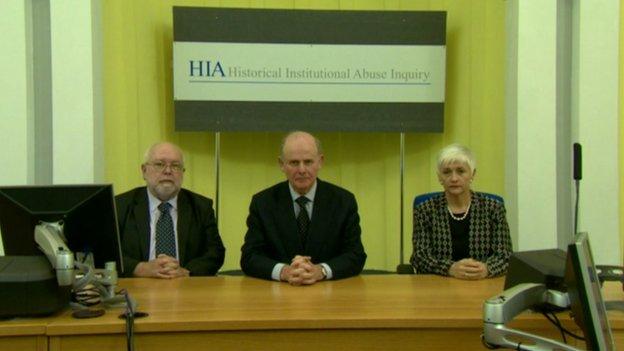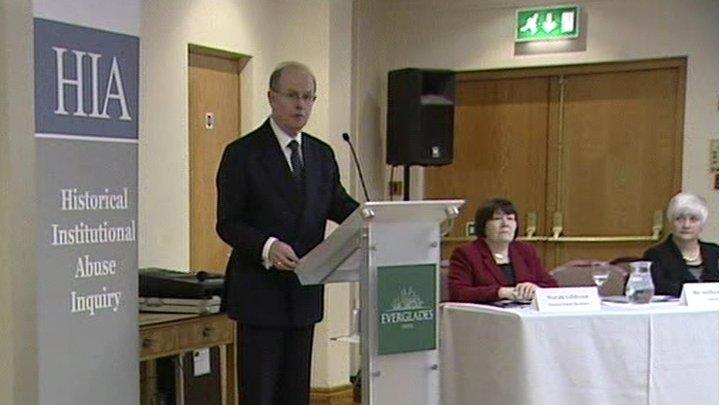HIA inquiry: MLAs agree to extend deadline by one year
- Published

The HIA inquiry, chaired by Sir Anthony Hart (centre) is being held in Banbridge courthouse, County Down
The Historical Institutional Abuse (HIA) inquiry is to run for a year longer than originally planned.
The extension, which will add an extra £4m to the final bill, was approved by the Northern Ireland Assembly.
The inquiry is examining allegations of child abuse in children's homes and other residential institutions in Northern Ireland from 1922 to 1995.
It had been due to deliver its final report in January 2016 but has been granted more time due to its workload.
Compensation payments
The public inquiry, chaired by retired High Court judge Sir Anthony Hart, is being held in Banbridge courthouse, County Down.
MLAs were told that Sir Anthony made a compelling case for the deadline extension, because of the number of witnesses who have come forward to testify and the amount of allegations he has to investigate.
However, some victims and survivors of institutional abuse have called for an interim report to be published and for compensation payments to begin before the conclusion of the inquiry.
Campaigners said that many victims of institutional abuse are elderly and some died before they were called to testify.
They said more victims may die before they see the final report in January 2017, or have the opportunity to benefit from a redress scheme.
The HIA inquiry was first announced in 2010 and was formally set up by the Office of the First and Deputy First Ministers (OFMDFM) on 31 May 2012.
Ulster Unionist leader Mike Nesbitt chairs the Stormont committee that scrutinises the work of office.
Delay concern
Speaking in the assembly on Tuesday, Mr Nesbitt asked OFMDFM Junior Minister Jennifer McCann to explain to victims why victims' request for an interim report was unreasonable.
Ms McCann replied that the chairman "wasn't in favour of doing an interim report because he felt it would delay the [final] report coming forward, and I have to say that we have to take on board what Judge Hart says".
It is not the first time MLAs have made changes to the HIA inquiry's timescale.
When it was originally announced in 2010, ministers initially said the public inquiry would examine abuse claims over a 50-year period from 1945 to 1995.
However, in October 2012, its remit was extended to investigate allegations dating back to the foundation of the state in 1922.
- Published13 January 2014
